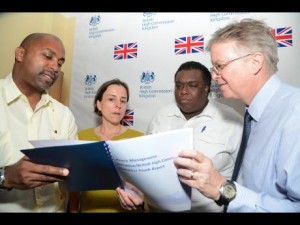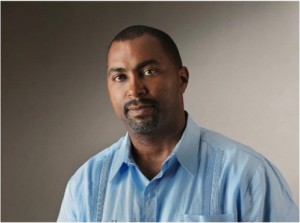
Homeless LGBT Youth Are Not “No One”
June 25th, 2015
Member of Parliament for South East St. Andrew Julian Robinson acknowledged, long ago, that he could not ignore the peculiar predicament of the “homeless gays,” as they are called, in a particular (comfortable, middle-class) part of his constituency. “This issue is not going away for me,” says Robinson, and as political representative he is duty bound to confront it.
And yet, this really quite small group of some thirty Jamaicans has been disregarded for years. Most of the residents of Upper St. Andrew have just been wishing they would go away, as they have often been disorderly and some have been accused of theft and assault. The police have had their hands full. 72 per cent of the young men live on the streets, often squatting in a communal situation where they cook together and share some basic amenities. Some of them “sofa surf” (sleep on friends’ couches). They are from financially deprived communities, where they grew up, left home, dropped out of school. They are unable to read beyond Grade Three level. In other words, their development generally reflects that of the most at-risk youth in inner city communities.
The majority of the group are gay men. Nine identify as bisexual and two as transgender. The young men regard living on the street as “being out.” So they are open about their sexuality, but with the level of discrimination and prejudice in Jamaica that in itself is a problem . At least one third are HIV-positive and health issues are a general concern; three quarters of this group suffer from HIV or other illnesses. 93 per cent of them engage in prostitution and have little other economic support.
The Peace Management Initiative (PMI) and the British High Commission responded “very quickly” to MP Robinson’s request for assistance, producing a study that boils down the critical issues affecting this fragile group. The Jamaica Constabulary Force, the Ministry of Health, J-FLAG and other stakeholders had been meeting to thrash out some of the concerns over the past three years. Now it was time to move towards finding solutions. British High Commissioner David Fitton conceded at the presentation of the “Peace Management Initiative/British High Commission Homeless Youth Report” on May 18 that he expected the challenges would be many and complex – but that didn’t mean they should shy away from them.
Programs Manager for the PMI in Kingston Damian Hutchinson pointed out that the ultimate goal was to get these young people “off the street.” With this in mind, the PMI organized a three-day residential workshop. Hutchinson reported that the group did “fantastically well” once ground rules were established. Of course, this is just the start of what could be a long journey towards rehabilitation and “reconnecting with society,” as Hutchinson said.
Because, let’s not underestimate it: The mental health challenges are overwhelming. With violence (from others, or within the group) an everyday occurrence, many have been raped and abused in their communities, in state institutions and on the street. Their emotions are volatile, their relationships intense and often full of conflict. Some have been on the street from as young as nine years old, after being sexually assaulted, forced into the way of life they now live. There is anger – why does society treat them this way? There is, inevitably, depression and a strong sense of being alone, rejected.
So work must continue at several levels, including psychological counseling (anger management, conflict resolution and so on), which is critical; and preparing the group for temporary housing solutions. Human rights activist Yvonne McCalla Sobers urged, “There needs to be stability” in the young people’s lives. She sees the issue of shelter as “medium to long term,” but added: “Not everyone who is homeless wants or needs to be helped.” Certainly, though, improving literacy and training for entrepreneurship or for possible employment must be key goals.
The report is a very good start. It has pointed to some critical concerns. But it seems to me that this stakeholders’ group now needs strengthening, with all members pulling together, and probably more being added (for example, the Mayor of Kingston & St. Andrew). Considering the very young age of many of the homeless men, I would also expect the Youth Minister to get involved. I wonder, too, if the PMI is working as closely as it could with the JCF (represented at the launch event by DSP Christopher Murdoch, who shared some insights from his own experience).
It is a long road, but the partners agree – they have to start somewhere. These young men are Jamaican citizens. They are not “no one,” as Damian Hutchinson emphasized. Almost all of the group said they wanted to make a change in their lives; so I am hopeful that these organizations, in collaboration, will help them to do so.

David Fitton (right), British high commissioner to Jamaica, looks at the Peace Management Initiative (PMI) Report on Homeless Youth with Julian Robinson (left), member of parliament for South East St Andrew; Julia Sutherland, deputy British high commissioner, and Damian Hutchinson, executive director of the PMI, at the high commission’s presentation of the report at the British High Commission in New Kingston. (Photo: Rudolph Brown/Gleaner)
Tags: British High Commission, Damian Hutchinson, HIV/AIDS, homeless, J-FLAG, Jamaica Constabulary Force, Julian Robinson, LGBT community, Member of Parliament, Peace Management Initiative, Yvonne McCalla Sobers
The Gleaner reserves the right not to publish comments that may be deemed libelous, derogatory or indecent.
To respond to The Gleaner please use the feedback form.
- We Are the Zoomers
- Living Online with Humans and Birds: NAOC 2020
- Human Trafficking and the Problem of Public Education
- Down Memory Lane
- Are We Ready to Recover from COVID-19?
- Road Safety Matters: Is Your Vehicle Safe?
- Sexual Harassment, Me Too, and the Minister’s Disturbing Giggle
- The Vulnerable Senior Citizens, Private Care Homes and COVID-19
- A Muddle Over Masks
- Here is Something Life-Saving You Can Do: Give Blood!




